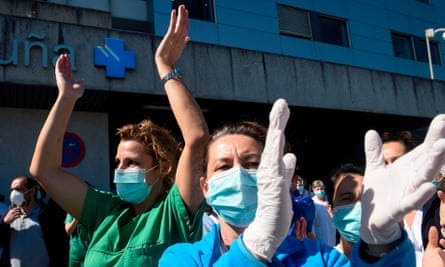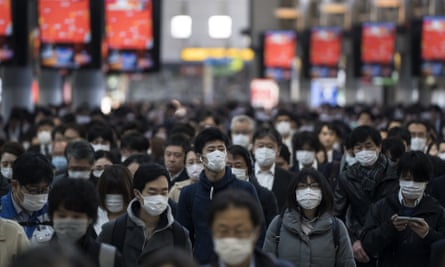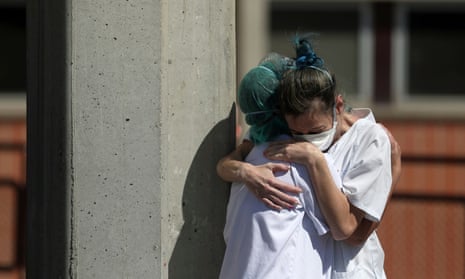The Spanish government has defended its response to the coronavirus pandemic as the death rate in the country slowed for the first time in a week, insisting its actions have always been firmly rooted in scientific advice.
Spain recorded 655 deaths from Covid-19 over the past 24 hours, bringing the total to 4,089, the health ministry said on Thursday. The number of confirmed cases stands at 56,188.
The numbers offered a glimmer of hope a day after the country recorded one of the world’s highest single-day death tolls of the pandemic to date at 738, and its total figure eclipsed that of China. The number of cases worldwide passed 500,000 on Thursday.
Spain’s foreign minister, Arancha González Laya, acknowledged that some things could have been done differently but said the nationwide “state of alarm” and lockdown imposed on 14 March was beginning to show results.
“It’s an unprecedented [crisis] in both depth and breadth,” she told the Guardian. “We’ve seen pandemics in the past, we’ve seen Ebola, for example, but it was much more localised. We’ve seen Sars, but it was much more localised. The impacts at a global level were much smaller, and Ebola was concentrated in countries that had extremely weak healthcare facilities and systems.
“But here we’re talking about a pandemic that is hitting the most prepared countries in the world hardest.”

González Laya said governments around the world faced questions about their management of the crisis, but Spain had always based its response “not on panic, not on feelings, but on science”.
Asked whether it had not been a huge mistake to let hundreds of thousands of people take part in nationwide marches for International Women’s Day on 8 March, she said the shift in the situation had only become clear the following day.
“It was on 9 March, a day later, that scientists told us ‘oh-oh, things are getting worse, so you should now move into a different level of alert’, which we did.”
González Laya also pointed out that different EU countries had opted for very different responses to the crisis. “The day we called for the state of alarm, we had 120 dead … and yet we declared the state of alarm and our neighbours did not.
“The UK, the Netherlands and Sweden decided to take an anchor point that was very different from the Spanish one. They decided in favour of so-called herd immunity.”
Earlier on Thursday the Spanish parliament approved an extension of the country’s near-total lockdown to 11 April, and the head of its health emergency centre, Fernando Simón, said the latest death toll figures should be read with caution. “We don’t know if this will be a trend, but to a certain point it does give us a bit of hope,” he said.
González Laya said further lockdown extensions and more drastic measures could not be ruled out. “We have done what was required at every moment and we will continue down that path,” she said.
Italy remains the hardest-hit country, with 7,503 deaths. Its infection rate had slowed for four consecutive days before Thursday, when it rose again.
Other countries are bracing for a rapid growth in cases, and an estimated 1.7 billion people worldwide have been ordered to remain in their homes.
In Hong Kong and Japan there are concerns about a possible new wave of coronavirus cases. The governor of Tokyo, Yuriko Koike, has asked residents to stay at home at all costs to avoid an “explosion” of infections.

China, which was hit by the virus first and now seems to be recovering, announced it was closing its borders to foreign nationals from this weekend and restricting foreign airlines to one route, with no more than one weekly flight. Each Chinese airline is permitted one route to any specific country with no more than one flight per week.
Russia announced on Thursday it would close all restaurants, bars, parks and non-essential shops, as the number of confirmed cases there rose to 840. Three people have died, according to official data.
Putin has delayed a vote on constitutional amendments that would allow him to remain in the Kremlin until 2036. He announced that next week would be a national holiday and urged Russians to stay at home. The government has also halted all international air traffic, except for flights repatriating Russian citizens, and ordered the military to build 16 medical centres to treat victims of the virus.
In Brazil, the former president Luiz Inácio Lula da Silva called for Jair Bolsonaro to resign or be impeached, adding his voice to the criticisms of the current president’s response to the pandemic. The virus has claimed at least 59 lives in Brazil and infected more than 2,500 people, but Bolsonaro has repeatedly dismissed the illness as a fantasy and a media “hysteria”.
Q&AHow can I protect myself and others from the coronavirus outbreak?
Show
The World Health Organization is recommending that people take simple precautions to reduce exposure to and transmission of the coronavirus, for which there is no specific cure or vaccine.
The UN agency advises people to:
- Frequently wash their hands with an alcohol-based hand rub or warm water and soap
- Cover their mouth and nose with a flexed elbow or tissue when sneezing or coughing
- Avoid close contact with anyone who has a fever or cough
- Seek early medical help if they have a fever, cough and difficulty breathing, and share their travel history with healthcare providers
- Advice about face masks varies. Wearing them while out and about may offer some protection against both spreading and catching the virus via coughs and sneezes, but it is not a cast-iron guarantee of protection
Many countries are now enforcing or recommending curfews or lockdowns. Check with your local authorities for up-to-date information about the situation in your area.
In the UK, NHS advice is that anyone with symptoms should stay at home for at least 7 days.
If you live with other people, they should stay at home for at least 14 days, to avoid spreading the infection outside the home.
The head of the WHO, Tedros Adhanom Ghebreyesus, said the time to act had been a month or two ago. “We squandered the first window of opportunity … this is a second opportunity, which we should not squander,” he said.
The World Trade Organization said the economic downturn and job losses resulting from the pandemic could be worse than the 2008 recession. It said its economists expected “a very sharp decline in trade”.
The economist Nouriel Roubini has described the financial shock from the virus as the fastest and deepest in history.
In the US, where more than 1,000 people have died and there are more than 55,000 confirmed cases, the Senate passed a $2tn (£1.63tn) emergency relief package, the biggest rescue deal of its kind in the country’s history.
While the bulk of the funds will go to corporations, the bill will expand unemployment insurance and provide up to $1,200 in direct relief for adults, a $367bn fund for small businesses and $130bn for hospitals. A record 3.3 million Americans filed claims for unemployment last week, figures announced on Thursday revealed, as the pandemic shut down large swaths of the economy.
The US secretary of state, Mike Pompeo, was rebuffed by other G7 members when he argued that the pandemic should be referred to as the “Wuhan virus” in a joint statement from the group, CNN reported. Donald Trump has frequently called it “the Chinese virus”.
New York has emerged as a virus hotspot with infections doubling every few days, according to the state governor, Andrew Cuomo. The virus has claimed 280 lives across the state.
In other developments, Afghanistan reported five new cases in the last 24 hours, bringing the total to 84, including four members of Nato forces and two foreign diplomats.
The UK government said Prince Charles did not get preferential treatment by receiving a coronavirus test before many NHS workers.
Iran’s health ministry said the country’s death toll from the virus had increased by 157 in the last 24 hours to 2,234, according to the semi-official Fars news agency.
A redeveloped urban park in Lisbon has been transformed into a makeshift drive-thru clinic for five-minute swab tests, according to Reuters. Portugal has reported 3,544 confirmed cases of the virus and 60 deaths.
